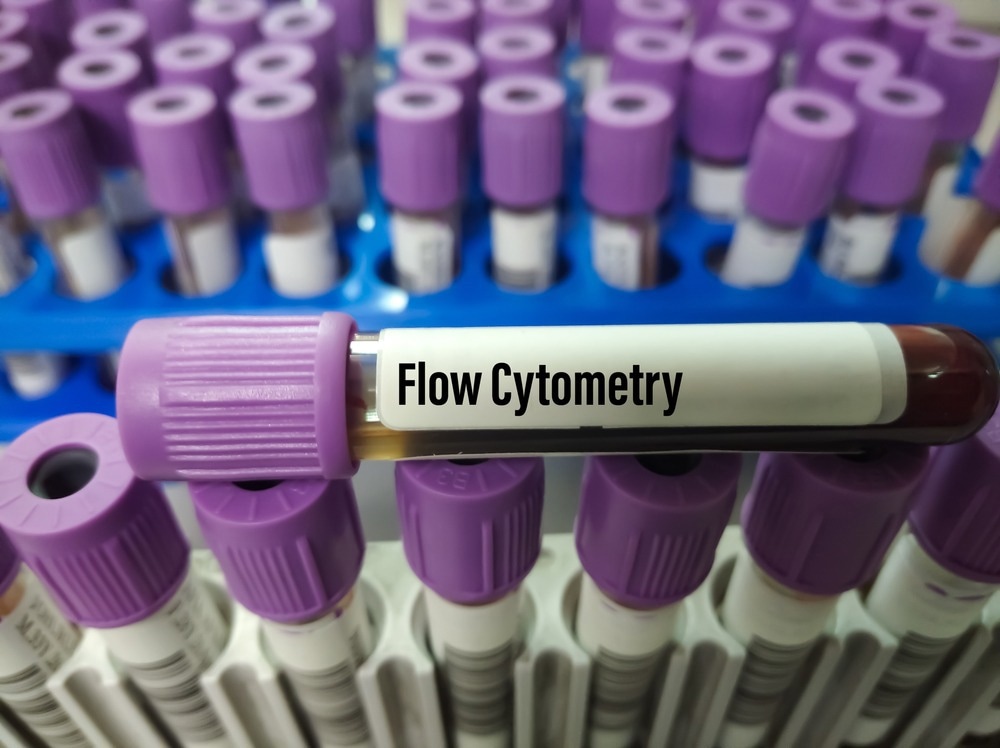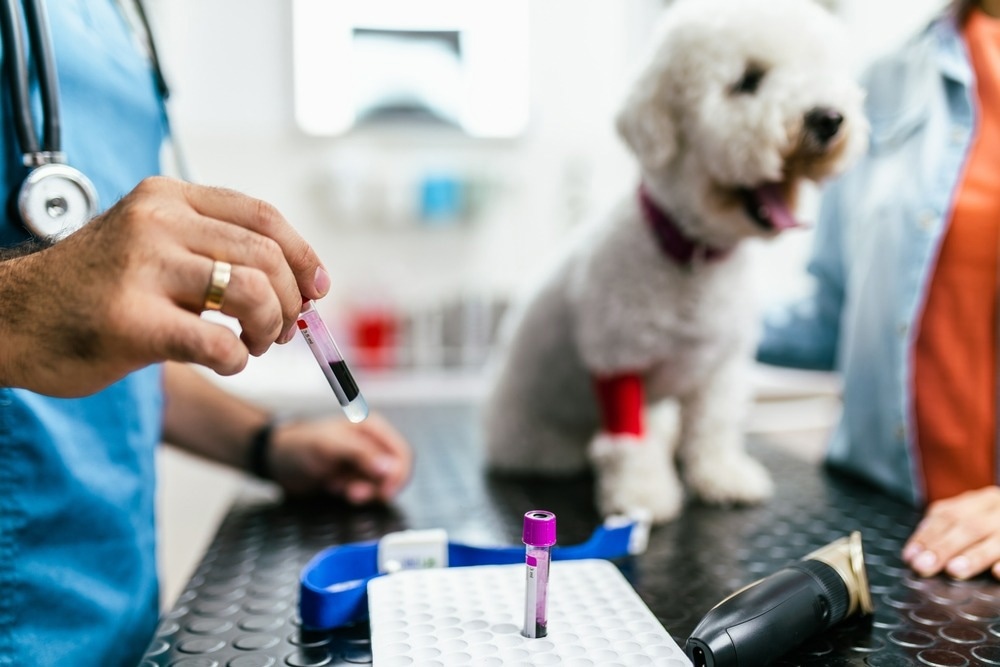What is flow cytometry?
Uses of flow cytometry in veterinary science
Limitations and future outlook
References
Further reading
The last few decades have completely transformed veterinary sciences; for example, the life expectancy of both cats and dogs has increased to a higher level than ever before. Veterinary science not only improves the health and well-being of animals but can also be critical to human health by monitoring and controlling zoonotic diseases. One technique that has been gaining popularity is flow cytometry, especially in assessing animal immunological state and development.

Image Credit: Sergey Nivens/Shutterstock.com
What is flow cytometry?
Flow cytometry is a widely used technique in assessing quantitative and qualitative aspects of cells, particularly in hematology and immunology. Flow cytometry uses lasers to produce signals detected and converted into data, giving insight into the analyzed cells. Flow cytometry uses expensive equipment and requires highly trained individuals.
Over the past 30 years, there have been significant advancements in flow cytometry that have allowed it to be more widely used and easier to navigate. It has also become a more reliable and effective tool, making it a more attractive technique in biochemical analysis. This has led to its increasing use in veterinary medicine.
Uses of flow cytometry in veterinary science
Flow cytometry is used in many parts of veterinary medicine; immunology, oncology, diagnosing autoimmune diseases, quantitation of reticulocytes, drug monitoring, and rabies.
Flow cytometry has played a critical role in evaluating immune function, especially in canines. Through flow cytometry, a subset of suppressive CD4+ T cells was discovered. Some animals that expressed higher levels of suppressive T cells were less likely to develop autoimmune disorders. This discovery led to the conclusion that these cells are pertinent in the mechanism involved in self-tolerance, as they would regulate and limit the immune system, preventing it from over-activating and attacking self-cells. This greater understanding of the role of immune cells is vital in treating different conditions.
One new use for flow cytometry is the pharmacodynamic monitoring of drugs. In some life-threatening conditions getting the correct treatment sooner significantly increases the chance of survival, hence the need for a reliable drug monitoring technique.

Image Credit: Babul Hosen/Shutterstock.com
Cyclosporine, a powerful drug that inhibits T cell production, is used in veterinary medicine to treat inflammatory and autoimmune conditions. Cyclosporine prevents the formation of immune cytokines, such as IFN-Y and IL2, lessening the immune response. Pharmacodynamic monitoring involves observing the effects of drugs and ensuring that it is within therapeutic levels.
One research group has developed a cyclosporin assay to measure its effects on dog tissues and observed two points from those assays; at low doses, the drug suppressed IFN-Y, whereas, at higher doses, it suppressed both IFN-Y and IL2. In this assay, flow cytometry was able to ensure the effectiveness of the drug and identify new markers.
Flow cytometry uses are not limited to treatment but can also be used in diagnosing conditions such as parasitemia (a parasitic blood infection) in dogs. Currently, two main methods are being used to diagnose this; looking at a blood smear and PCR (polymerase chain reaction).
Using blood smears can be difficult as many parasites would be required for the test to give a positive result, therefore; resulting in many false-negative results. PCR, as a technique, is very sensitive; even a few parasitized red blood cells would result in a false-positive result. Flow cytometry is a middle ground between these techniques and allows for a more reliable result.
A new approach to detecting intracellular rabies virus antigens involves using flow cytometry. One of the advantages of using flow cytometry in this field would be the decrease in time taken to confirm a viral infection. Therefore this technique could be critical for industries currently trying to produce rabies vaccines or antiviral drugs.

Image Credit: hedgehog94/Shutterstock.com
Flow cytometry has a promising future in oncology. Acute leukemia in dogs is rarely cured and has a poor prognosis; this is also due to the poor differentiation of lineages of the cells. Classification of acute leukemia into the different lineages would improve prognosis. The traditional methods currently used in characterizing cell lineages are subjective in interpretation and difficult to quantify; therefore, flow cytometry would allow for more developments in this field. Flow cytometry can assess multiple features of large numbers of cells with comparatively objective criteria.
Limitations and future outlook
Even though flow cytometry has a hopeful future in many parts of veterinarian science, it has its own set of challenges that need work. Some of the limitations include the high cost of the instruments and the need for highly trained personnel. Flow cytometry also requires single-celled suspensions as aggregates would give false results. However, when looking at the limitations, one must not overlook the uses, and importance flow cytometry still holds. Some information gained from flow cytometry has been used to improve and refine a more quantitatively robust reverse transcriptase PCR assay; this exhibits the vast array of uses for flow cytometry and its significance in future scientific research.
References
- J., Thomason & Archer, Todd & Mackin, Andrew & Stokes, John & Pinchuk, Lesya. (2014). Applications of Flow Cytometry in Veterinary Research and Small Animal Clinical Practice. Journal of Veterinary Medicine and Research. 1. 1-9.
- Reggeti, F., & Bienzle, D. (2011). Flow cytometry in veterinary oncology. Veterinary pathology, 48(1), 223–235. https://doi.org/10.1177/0300985810379435
- Molla, D., Z. Tekle, A. Ayisheshim, D. Kebede, A. Wondimu and W.M. Ahmed, 2019. Flow cytometry and its diagnostic application in animal health: A review. Global Vet., 21: 1-7. DOI: 10.5829/idosi.gv.2019.01.07
Further Reading
Last Updated: Sep 22, 2022